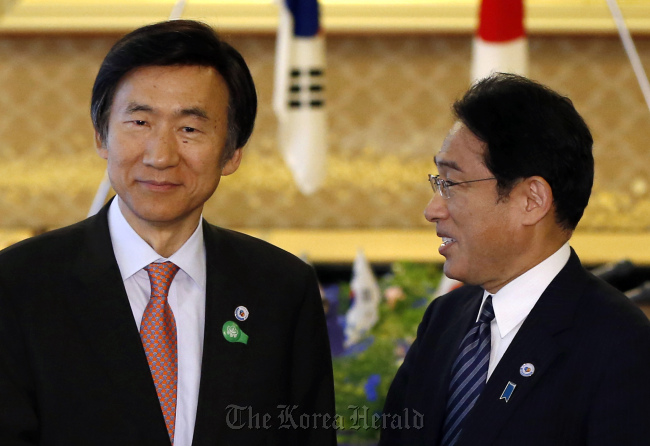Less than a day after South Korea and Japan clinched a breakthrough on Tokyo’s UNESCO World Heritage bid, tension is brewing again as Japan attempts to water down its statement on the use of forced Korean labor during the colonial period.
Twenty-three Japanese wartime industrial facilities were listed as UNESCO World Heritage sites Sunday, following a compromise that Tokyo stipulates that it forced Koreans to work at some of them and plans to honor them in the final document.
In a footnote enshrined on the text, Japan said it was “prepared to take measures that allow an understanding that there were a large number of Koreans and others who were brought against their will and forced to work under harsh conditions in the 1940s at some of the sites.” It also vowed to “incorporate appropriate measures into the interpretive strategy to remember the victims,” such as establishing an information center.
Seoul officials touted the outcome as it marked the former occupier’s first-ever official acknowledgement of forced labor at the sites.
Yet Japanese Foreign Minister Fumio Kishida instantly downplayed the language after the decision was made at a World Heritage Committee conference in Bonn, Germany, saying that it did not mean “forced labor.”
A tentative Japanese version of the document distributed by the Shinzo Abe administration to local media simply stated that the victims “got to work” at the sites, apparently undermining the coercive nature of their recruitment.
 |
South Korea`s Foreign Minister Yun Byung-se (left) poses with his Japanese counterpart Fumio Kishida before their meeting in Tokyo on June 21. (AP-Yonhap) |
Some degree of strategic ambiguity or discrepancies in interpretation may be inevitable given the sensitivity of the matter and public sentiment at home, especially so because Tokyo has long insisted that the issue was already resolved through a 1965 agreement that normalized the bilateral ties.
Cabinet Secretary Yoshihide Suga also reaffirmed Kishida’s remarks on Monday, adding that they confirmed during the negotiations with Seoul that Japan’s statement will not be “used” in the context of the 50-year-old pact. “Our position has not changed at all,” he said at a news briefing.
Seoul officials dismissed the minister’s claim, stressing such expressions carried in the decision as “against their will” and “forced to work” indisputably indicate the forcefulness.
“The official text, written in English, is the original ― there’s no room for misinterpretation,” presidential foreign affairs and security secretary Ju Chul-ki told reporters.
A senior Foreign Ministry official reiterated the stance, adding: “The most crucial point is how to comprehend Japan’s statement on the outcome in light of international norms and customs, rather than commenting on every news conference that takes place in Japan.”
Despite the budding war of words, the two countries will likely refrain from further escalations as they are seeking to mend ties severely stifled by historical and territorial spats and arrange a long-delayed summit between President Park Geun-hye and Abe later this year.
Officials here said they would closely watch how Tokyo follows through on its pledges, including the information disclosure, and thus demonstrate its sincerity.
Under the plan, Tokyo is supposed to devise a follow-up mechanism and report development to the World Heritage Center by the end of 2017, which is expected to be reviewed by the World Heritage Committee at a meeting the following year.
The measures should be in line with the committee’s request for an “interpretive strategy” that will enable an understanding of the “full history” of each site. It also recommended Japan seek advice from the UNESCO advisory panel International Council on Monuments and Sites.
“The decision was made and will be carried out with certain formalities,” the ministry official added. “After all, it’s something that the Japanese government publicly declared in the international community, and its implementation will be monitored through the U.N. mechanism.”
By Shin Hyon-hee (
heeshin@heraldcorp.com)








